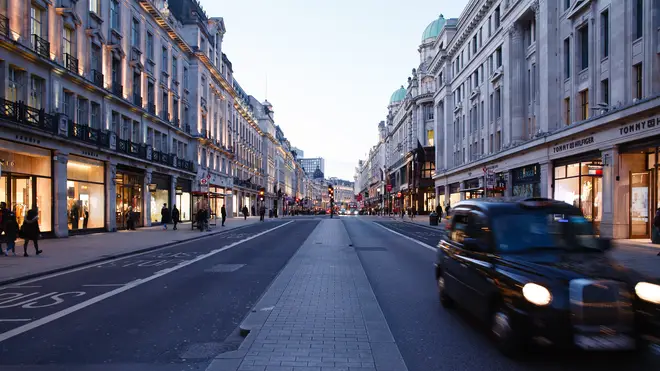
James O'Brien 10am - 1pm
4 May 2020, 08:26

With calls to end the UK's coronavirus lockdown growing, what could life and business look like once the Covid-19 restrictions are lifted by Boris Johnson?
With the UK now "past the peak" of the coronavirus crisis, and Prime Minister Boris Johnson suggesting the country is now “on the downward slope” of the outbreak, many are calling for clarity over when the lockdown will end.
The country has been on lockdown since March 23 with strict restrictions in place on movement and some businesses have been required by law to close, others have been forced to enact social-distancing guidelines.
On Sunday the PM is expected to lay out his road map out of lockdown and return to work for many Brits who have been forced to work from home, or placed on leave.
Read more: Life after coronavirus lockdown - What could it look like?
But what will things look like once the lockdown is lifted? Here's everything we know so far:
Emma McClarkin, the chief executive of the British Beer and Pub Association, said reopening bars and pubs while observing social distancing measures would be "extremely difficult" for staff and customers alike.
She warned that trade wouldn't immediately return to pre-coronavirus levels, and could, in fact, be down by up to 50%.
"It’s clear that the government are going to need to give pubs special consideration for a restart, as well as specific support just for them.
"We need these measures put in place now, to ensure that pubs can survive and be ready to re-open when safe to do so and then help as they slowly recover.
"Trade will not immediately return to the level it was before the COVID-19 crisis hit when pubs reopen.
"Upon reopening, trade could be down by as much as half what it was before.
"It will inevitably take time for consumer confidence to build. Social distancing restrictions in pubs will inevitably have a direct effect on footfall in pubs."

Large group playing cricket during coronavirus lockdown run away from police
Since the lockdown conditions were first imposed on March 23, most of the nation's office workers have become accustomed to working from home.
However, companies that are eager for workers to return to the office will need to make a number of changes in order to ensure the health and safety of staff is not compromised.
Staggered shift times, less sharing of equipment and continued maximisation of home working are among a number of ideas listed as part of a draft government strategy to help businesses prepare for a return to work, according to the Financial Times newspaper.
Increased hygiene procedures and the installation of protective screens are also included in the plan.
Meanwhile, the Guardian says ministers are holding talks with technology firms over the creation of "health passports" which use "coronavirus testing and facial recognition" to prove which workers have had Covid-19.

New Zealand set to ease lockdown measures
Last month, the British Retail Consortium (BRC) published guidance for measures that retail stores could introduce to help with the transition once restrictions are lifted.
The recommended measures include limiting entry and exit points, using floor markings to outline social distancing and keeping changing rooms closed.
The guidance also suggests installing cleaning stations with hand sanitiser and disinfectant wipes at the front of stores.
BRC chief Helen Dickinson said the guidance measures would serve to ensure the safety and well-being of both customers and staff.
"Since the lockdown, many retailers have proved how shops can be run safely and effectively in line with the Government's social distancing advice," she said.
"Continued close collaboration with Government, including public support for the steps retailers are taking and adequate notice to get supply chains up and running, will mean that retail businesses can start trading again slowly and safely, and customers can feel confident that they are safe to return to shops."
Listen & subscribe: Global Player | Apple Podcasts | Google Podcasts | Spotify
Public transport is one of the biggest issues for many people as they prepare to return to the office.
Transport Secretary Grant Shapp said increased bus and train timetables will be implemented to help the public transport system cope with an influx in passengers while still adhering to social distancing recommendations.
"The first thing is, obviously, we'll expand the number of trains and buses running," Mr Shapps said.
He also pointed to active transport methods such as cycling as a way for people to take more personal responsibility for their welfare.
"The second thing to say is active travel, I think, is a very important part of this, by which I mean cycling, walking and so on," he said.
"There's been a massive increase ... hundreds of per cent more people using the existing scheme where you can go to your employer and ask for a bike which you pay back through the loan and effectively before you pay tax, and that's a very popular scheme and I think active transport, active mobility is something we've been doing a lot more of."
Heathrow chief executive John Holland-Kaye has warned that the nation's major international airports do not have enough space for social distancing to be a solution for safe travel post-lockdown.
"Forget social distancing - it won't work in aviation or any other form of public transport, and the problem is not the plane, it is the lack of space in the airport," he wrote in the Daily Telegraph.
"Just one jumbo jet would require a queue a kilometre long."
Instead, Mr Holland-Kaye believes mandatory health checks for passengers, increased levels of hygiene and compulsory face masks would be more realistic options to enable airports to reopen and air travel to resume.